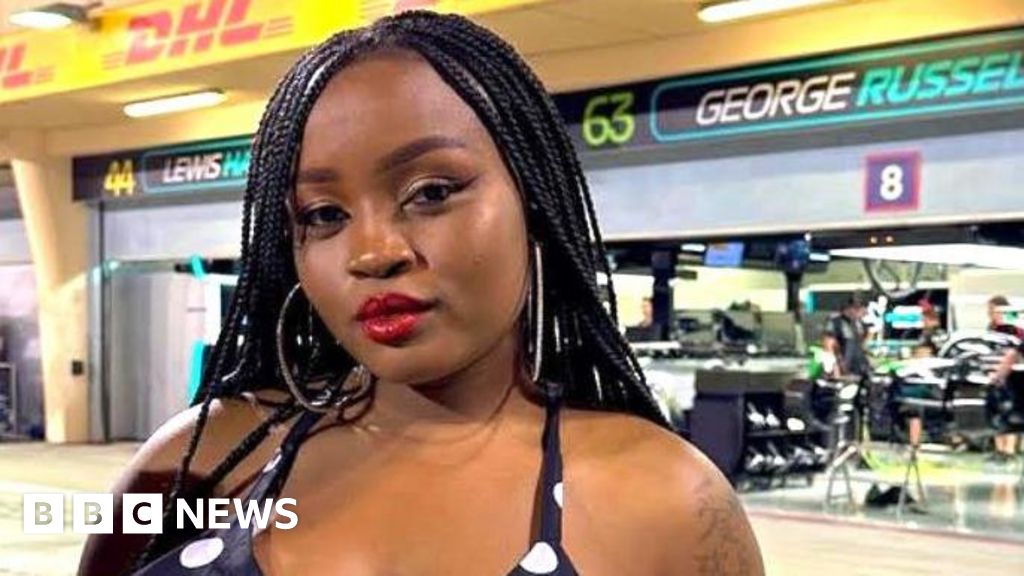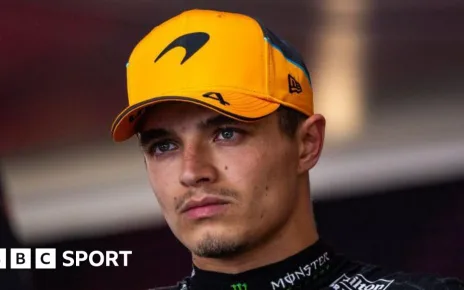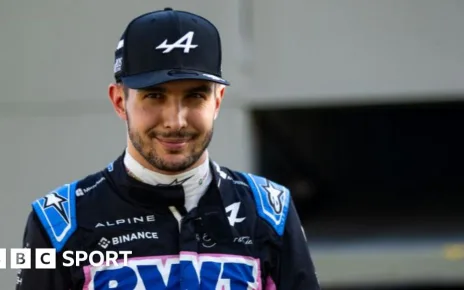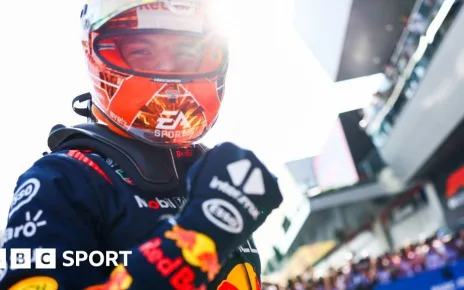Gloria Aradi,BBC News, Nairobi
 Joy Jeptoo/Instagram
Joy Jeptoo/InstagramJoy Jeptoo, a 24-year-old social media influencer from Kenya, spent several thousand dollars last year to attend the Formula 1 season opener in Bahrain and the final race of the season in the UAE capital, Abu Dhabi.
She likens her passion to the way that “football lovers always want to go to the stadiums to support their team and also explore a new country”.
The Middle East, which hosts four F1 races a year, has emerged as a popular destination for Africans seeking to watch races in person. They cannot, however, enjoy a race on their own continent as Africa remains the only one excluded from the F1 race calendar.
For some members of Kenya’s largest F1 community, Paddock Experience, attending races has become a yearly custom, with people splurging more than $2,500 (£2,000) to see a single event.
They are among Africa’s fast-growing new generation of diehard fans of F1, a historically Eurocentric sport that is experiencing an unprecedented boom on the continent.
In North Africa, television audiences have more than trebled and those behind F1 see the entire continent as a potential growth market on TV and digital platforms.
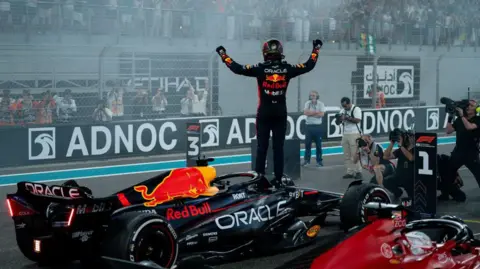 Getty Images
Getty ImagesMany fans pin the surge in F1 interest in Africa on the Netflix effect.
Drive to Survive, a thrilling behind-the scenes docuseries detailing the dramatic rivalries in the sport, has been credited with taking the sport beyond its core European audience.
“When you’re scrolling on Netflix and then you see Drive to Survive, you end up watching and then you get interested in the sport,” Ms Jeptoo says.
Kamal Onyedikachukwu, a Nigerian behind the F1 news account F1 Naija on X, says that the Covid pandemic boosted interest as people started watching Drive to Survive during lockdowns.
He believes that technology is another driving force behind F1’s growing presence in Africa.
When he started following the sport in 2005, the only way of viewing it in Nigeria was by watching playbacks of races on terrestrial TV.
Fans can now access live races by subscribing to F1 TV, the official streaming service for Formula 1, with prices starting at $4 a month, or through the Motorsport channel, which is available on DStv, Africa’s biggest subscription TV service.
While F1-viewing parties have become a popular alternative for fans who desire more exciting race experiences.
Quizzes, free drinks, prize giveaways and music are on offer to entice fans off their sofas and out of their homes.
In Kenya’s capital, Nairobi, entertainment hotspots compete to lure fans and their wallets during race weekends.
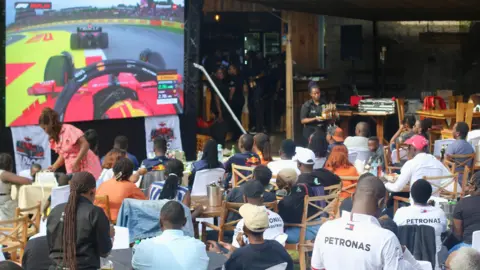 Paddock Experience
Paddock ExperienceMs Jeptoo is often hired by entertainment venues in the city to host F1 parties and draw in fans who can spend generously on food and drinks during races.
She says that entertainment hotspots go for hosts with “engagement and influence”. With more than 40,000 followers on Instagram and nearly 100,000 on X, Ms Jeptoo fits the bill.
Paddock Experience, run by friends and long-time F1 fans Mbalu Makau, Mose Mokuah and Andrew Alovi, has been hosting viewing parties since 2021, as the sport’s popularity started to soar in Kenya.
They partner with entertainment hotspots in Nairobi and elsewhere, bringing in fans who spend an average of $15 to $22 each on food and drink.
They pull in crowds of up to 1,400 on some race days. They also have relationships with F1 clubs in Ghana, where viewing parties have become a big phenomenon.
Female fans of what has been a traditionally male-dominated sport are also on the rise in Africa.
“What I’ve noticed from my interactions every weekend is that we have more women coming in to learn about the sport, not just the glitz and glamour of what the sport is, but also the engineering side of things,” Mr Onyedikachukwu says.
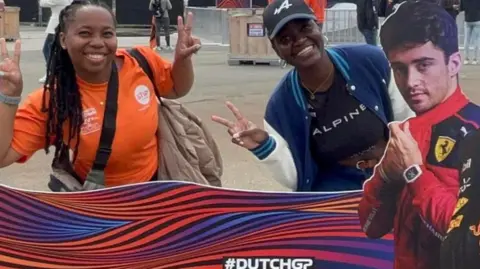 Hairpins and Straights/Instagram
Hairpins and Straights/InstagramSome female fans are taking on a more active role, such as Baaba Jenkins and Queendela Adu-Poku, two Ghanaian women working in finance in London.
Their love for F1 has seen them travel to attend races around the world, from Singapore to Abu Dhabi, Britain and the Netherlands.
The friends run the popular F1 podcast Hairpins and Straights, giving fans in-depth race reviews, interviews and content about travel to races.
“We didn’t know where to start from. We didn’t have any ins into motorsport,” says Ms Adu-Poku.
“It was just Baaba and I rambling on a podcast and trying to figure out the whole podcast space… literally starting from scratch, not being popular people, not knowing anything about the sport.”
They were among those who discovered and developed an interest in F1 after watching Drive to Survive
The young women say they want to share their love for the sport through their podcast and use it to grow the representation of Africans involved in F1.
But Ms Jenkins says they occasionally encounter hostility and prejudice from male fans who think women cannot have a genuine interest in the sport or only watch it for attractive male drivers.
In such scenarios, she says, it is “very important to stand up for ourselves as women”.
 Getty Images
Getty ImagesDespite the vast following F1 commands in Africa, the continent has not hosted an official race in more than three decades.
African fans and the sport’s most successful, and only black, driver, Lewis Hamilton, have been rallying for its return to the continent, arguing that it is unfair for Africa to be left out while the US alone hosts three races a year.
Although there have been reports about F1 mulling a return to Morocco or potentially racing in Rwanda or Zanzibar, the Kyalami circuit near Johannesburg in South Africa, is seen as the obvious venue choice.
Kyalami, which hosted multiple F1 races between 1967 and 1993, is considered one of the sport’s most historic circuits.
The long-awaited Formula 1 return to South Africa appeared possible in 2022, when the management of Kyalami met all the relevant groups.
The process seemed on track until negotiations collapsed due to South Africa’s ties with Russia.
Toby Venter, head of the OT Venter group of companies, which owns the Kyalami circuit, says that the mooted attendance of Russian President Vladimir Putin at a summit in South Africa plus the docking of a Russian ship at a naval base scuppered the plans.
“Thereafter the Americans got cold feet,” he tells the BBC.
He says the circuit had already “made extensive plans and preparations” to upgrade the circuit so “it was very sad that unfortunately, politics interfered”.
He argues that F1 is “not a true world championship without Africa”.
“I think if F1 came to Africa it would be packed because you have clubs in Ghana, Kenya, South Africa, Uganda, everywhere,” says Mr Makau of Paddock Experience.
“You would have the whole of Africa moving to that country to support F1.”
You may also be interested in:
 Getty Images/BBC
Getty Images/BBC
